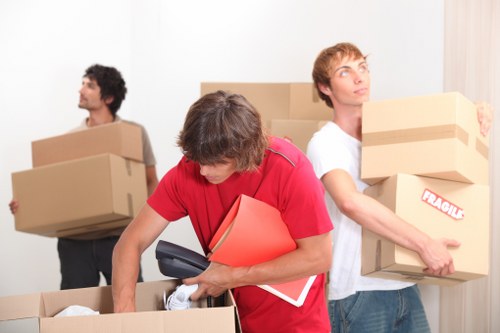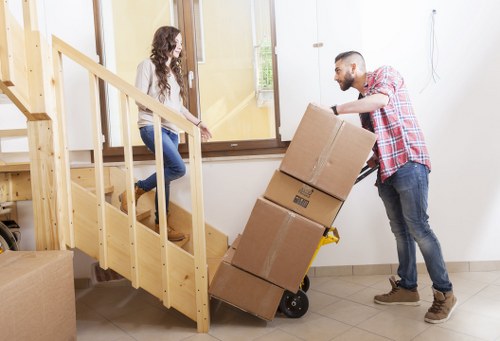White Goods Recycle Rickmansworth: A Comprehensive Guide

Recycling white goods in Rickmansworth is not only environmentally responsible but also beneficial for the community. White goods, such as refrigerators, washing machines, and ovens, can take up significant space in landfills and often contain harmful materials. By choosing to recycle these appliances, residents contribute to a cleaner and more sustainable environment.
Rickmansworth, located in Hertfordshire, offers several options for recycling white goods. Whether you're upgrading your appliances or disposing of old ones, understanding the recycling process and available services can make the experience seamless and efficient.
In this article, we'll explore the best practices for recycling white goods in Rickmansworth, the benefits of recycling, and provide a list of nearby areas that also offer recycling services. Let's dive in!
Why Recycle White Goods?

Recycling white goods has numerous advantages. Firstly, it reduces the amount of waste sent to landfills, preserving natural resources and minimizing environmental impact. Many components of white goods, such as metals and plastics, can be repurposed, reducing the need for new raw materials.
Secondly, recycling helps in conserving energy. Manufacturing products from recycled materials typically requires less energy compared to producing them from virgin resources. This energy savings translates to lower carbon emissions, contributing to the fight against climate change.
Moreover, recycling white goods promotes a circular economy, where products are reused and recycled, fostering sustainable consumption patterns. It also creates job opportunities in the recycling and manufacturing sectors, boosting the local economy.
How to Recycle White Goods in Rickmansworth

Recycling white goods in Rickmansworth is straightforward with several options available to residents. Here's a step-by-step guide to help you through the process:
- Assess Your Appliance: Determine whether your white good is still functional. If it is, consider donating it to local charities or community centers.
- Contact Recycling Services: Reach out to local recycling centers or waste management companies that accept white goods. Many offer free or low-cost pickup services.
- Prepare the Appliance: Ensure the appliance is clean and free from personal belongings. For safety reasons, it's advisable to disconnect and empty all appliances before recycling.
- Arrange for Pickup or Drop-off: Schedule a convenient time for the appliance to be collected or find out where the nearest drop-off points are located.
- Verify Recycling Practices: Choose recycling services that follow eco-friendly practices, ensuring that your appliance is processed responsibly.
Local Recycling Facilities in Rickmansworth

Rickmansworth boasts several facilities dedicated to recycling white goods. These centers are equipped to handle large appliances and ensure they're recycled properly. Here are some notable options:
- Rickmansworth Waste Management Centre: Offers comprehensive recycling services for various household appliances, including white goods. They provide both drop-off and pickup options.
- EcoCycle Recycling: A local company specializing in the recycling of electronic and large household items. EcoCycle ensures all recycled materials meet environmental standards.
- Green Recycling Hub: Known for its eco-friendly approach, this hub accepts a wide range of white goods and focuses on minimizing waste through effective recycling methods.
Benefits of Choosing Local Recycling Services

Opting for local recycling services in Rickmansworth offers several benefits:
- Convenience: Proximity makes it easier to schedule pickups or drop-offs without significant travel.
- Support Local Economy: Utilizing local services supports businesses within the community, fostering economic growth.
- Environmental Impact: Reducing transportation distances lowers carbon emissions, contributing to a greener environment.
- Compliance: Local recycling centers adhere to regional regulations, ensuring your appliances are recycled legally and responsibly.
Eco-Friendly Disposal Tips
While recycling is a great option, here are some additional tips to dispose of your white goods in an eco-friendly manner:
- Donate if Functional: Many charities accept working appliances, providing them to those in need.
- Sell or Give Away: Platforms like local classifieds or community boards can help you find new owners for your appliances.
- Properly Disconnect: Ensure all appliances are safely disconnected from power sources to prevent hazards during transport.
- Remove Hazardous Components: Items like refrigerators contain refrigerants that require special handling. Let professionals manage their removal.
Nearby Areas Offering White Goods Recycling
Rickmansworth is surrounded by several areas that provide excellent white goods recycling services. Here are some of the closest and most reliable options:
- Watford: Just a short drive from Rickmansworth, Watford offers multiple recycling centers with comprehensive services.
- Amersham: Known for its eco-friendly initiatives, Amersham provides efficient recycling solutions for white goods.
- Chorleywood: Offers convenient recycling options with a focus on sustainable practices.
- Northwood: Provides both pickup and drop-off services, making recycling hassle-free.
- Bushey: Features state-of-the-art recycling facilities equipped to handle various appliances.
- St Albans: A larger hub with extensive recycling programs catering to diverse needs.
- Hemel Hempstead: Offers reliable recycling services with a commitment to environmental responsibility.
- Mill Hill: Provides specialized recycling options for electronic and large household items.
- Kings Langley: Known for its efficient and eco-friendly recycling practices.
- Welwyn Garden City: Offers a range of recycling services, ensuring comprehensive waste management.
- Harpenden: Provides convenient recycling solutions with a focus on sustainability.
- Eastcote: Features accessible recycling centers equipped to handle white goods.
- Borehamwood: Offers extensive recycling facilities with a commitment to reducing environmental impact.
- Carpenders Park: Provides reliable and eco-friendly recycling options for various appliances.
- Chipping Barnet: Known for its robust recycling programs and comprehensive services.
Choosing the Right Recycling Service
Selecting the appropriate recycling service is crucial to ensure your white goods are handled responsibly. Consider the following factors:
- Reputation: Look for services with positive reviews and a track record of reliable recycling practices.
- Certifications: Ensure the recycler is certified and adheres to environmental regulations.
- Services Offered: Choose a service that provides the type of recycling you need, whether it's pickup, drop-off, or specialized handling.
- Cost: Compare prices and choose a service that offers fair pricing without compromising on quality.
- Customer Support: Good customer service ensures any queries or issues are promptly addressed.
Environmental Impact of Recycling White Goods
Recycling white goods significantly reduces the environmental footprint of households. By diverting appliances from landfills, it minimizes soil and water contamination caused by hazardous materials. Additionally, recycling conserves natural resources by reusing materials like steel, aluminum, and plastic, reducing the need for mining and manufacturing new products.
Furthermore, recycling white goods decreases greenhouse gas emissions. The production of new appliances is energy-intensive, and using recycled materials requires less energy, thus lowering overall emissions. This contributes to global efforts to combat climate change and promote sustainability.
Community-wise, recycling fosters a sense of responsibility and environmental stewardship among residents. It encourages sustainable habits and raises awareness about the importance of waste management and conservation.
Economic Benefits of Recycling
Recycling white goods also offers economic advantages. It creates jobs in the recycling sector, from collection and processing to manufacturing recycled products. These jobs support the local economy and provide livelihoods for many individuals.
Moreover, recycling can lead to cost savings for consumers. Producing goods from recycled materials often costs less, which can translate to lower prices for consumers. Additionally, some recycling programs offer incentives or rebates, further reducing costs.
Businesses benefit as well by reducing waste disposal fees and gaining access to affordable recycled materials. This can improve profitability and competitiveness in the market.
Challenges in Recycling White Goods
Despite the benefits, recycling white goods presents certain challenges:
- Complexity: White goods often contain multiple materials, making the recycling process intricate and requiring specialized facilities.
- Costs: The initial investment in recycling infrastructure can be high, and maintaining these facilities requires ongoing funding.
- Awareness: Some residents may lack knowledge about recycling options, leading to lower participation rates.
- Logistics: Transporting large appliances to recycling centers involves logistical planning and can be resource-intensive.
- Regulations: Compliance with environmental regulations can be complex and varies by region, posing challenges for recyclers.
Future of White Goods Recycling
The future of white goods recycling looks promising with advancements in technology and increasing environmental awareness. Innovations in recycling processes are making it easier and more efficient to dismantle and recycle appliances. Automation and improved sorting techniques can enhance the accuracy and speed of recycling operations.
Additionally, the rise of the circular economy model encourages manufacturers to design appliances with recyclability in mind. This shift promotes the use of sustainable materials and modular designs, simplifying the recycling process.
Public education campaigns and incentives for recycling are expected to boost participation rates. As more people recognize the importance of recycling, community engagement will drive greater environmental and economic benefits.
Conclusion
Recycling white goods in Rickmansworth is a vital practice for maintaining a sustainable and eco-friendly community. By choosing to recycle, residents not only help protect the environment but also support the local economy. With numerous recycling facilities available in Rickmansworth and surrounding areas, the process is convenient and accessible.
Understanding the benefits, challenges, and best practices of white goods recycling empowers individuals to make informed decisions. As technology and awareness continue to evolve, the future of recycling promises even greater positive impacts on both the environment and the economy.
Frequently Asked Questions
1. What types of white goods can be recycled in Rickmansworth?
Most large household appliances, including refrigerators, washing machines, dishwashers, ovens, and freezers, can be recycled. It's best to check with your local recycling center for specific guidelines.
2. Is there a cost associated with recycling white goods in Rickmansworth?
Many recycling services offer free pickup for white goods, especially if the appliance is non-functional. However, some may charge a fee based on the size or type of appliance. It's advisable to contact the recycling center for detailed information.
3. How should I prepare my white goods for recycling?
Ensure the appliance is empty and clean. For safety, disconnect it from power sources. Some facilities may require you to remove certain parts, so it's best to follow the specific instructions provided by the recycling service.
4. Can I recycle white goods that are still working?
Yes, functional appliances can often be donated to charities or sold. If you prefer not to keep them, recycling centers will still accept them, but donating is a more sustainable option as it extends the appliance's life.
5. What happens to white goods after they are recycled?
After recycling, white goods are dismantled, and materials like metals, plastics, and glass are separated. These materials are then processed and reused in manufacturing new products, reducing the need for virgin resources.